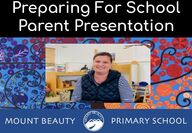
Return to flip book view
Preparing For SchoolParent Presentation
We acknowledges the Dhudhuroa People as the Traditional Custodians of the land upon which our school campus is built.We pay our respects to all Aboriginal and Torres Strait Islander people, their Elders past and present.Welcome to Country
This presentation will cover the following:1. What to expect from the first day and first weeks of school2. Skills that the children should be working towards3. What you can do at home, now4. How we approach reading and writing here at school5. How we approach Remote Learning
•Discuss how your child will use the toilets at school. •Remind them that they will be given regular times to go throughout the school day. They must always ask the teacher before they go during class time. •For boys: familiarise with urinals and make sure they know how to use them correctly. •Pack a spare pair of underpants in your child’s school bag- just in case! Toileting
*Also known as Fruit Snack
Rich whole language experiences, using high quality texts that ignite students’ passion for reading and storiesA synthetic phonics program that explicitly teaches the code, the 44 sounds and how to manipulate those sounds to create word.The Reading Rope
Children are biologically primed to learn the language that they speak, but are not primed to learn the writing system of that language. We need to teach them explicitly.We need to teach them:1. The concepts that underpin the writing system2. The code knowledge and 3. The 3 skills they need to enable them to become readers and writers.Word Recognition
Concepts:1. You can spell a SOUND with 1, 2, 3 or 4 letters2. There are many different ways of spelling a sound3. A spelling can represent more than one soundReading Concepts
Alphabet Code: (It’s not just the ABC)There are 175 common ways to spell the 44 sounds in the English LanguageWe start with one letter = one soundThis is closely followed with: you can spell a sound with 2 letters/ll/ as in bell or /ch/ as in cheeseThe Alphabet Code
Skills:Segmenting - Pulling sounds apart in wordsBlending - Pushing sounds together to make wordsPhoneme manipulation - taking out one sound and replacing it with another; d/o/g/-d/i/gReading Skills
• Children who enjoy books are always more enthusiastic to learn to read. • Practise holding a book correctly and turning the pages.• Ask questions about what you’ve read. For example:• What happened next?• What was your favourite part?READ, READ, READ
Remote Learning is a tough gig but we work hard to provide a smooth continuance between on-site and o-site learning. We also encourage parents to maintain strong communications between teacher and parents, so that the educational experience is not interrupted too much.The following slide details how our school runs our RL programRemote Learning
Remote Learning in the Early Years:Our team have worked hard to create a Program that balances both technology and paper based learning.Our Program consists of the following elements, and these are consistent in all Prep-2 classes:1. A Paper-Based Booklet: With handwriting, spelling, writing and maths tasks2. Take Home Readers 3. SeeSaw Family: For parents to communicate with the teacher4. SeeSaw Class: For students to access instructional videos5. Online Platforms: Reading Eggs, Essential Assessment and Wushka (online e-readers).6. Specialists Lessons: (French, PE, Art and Library) run lessons on a Wednesday during Remote learning.7. Weekly Webex Meetings: To stay connected with the teacher and classmates.The Program is now a well-oiled machine and works really well.Sample Spelling LessonSample Maths Lesson
Thank you for reading, watching and listening.We appreciate you taking the time to learn more about school readiness and preparedness.Thank you for Reading!